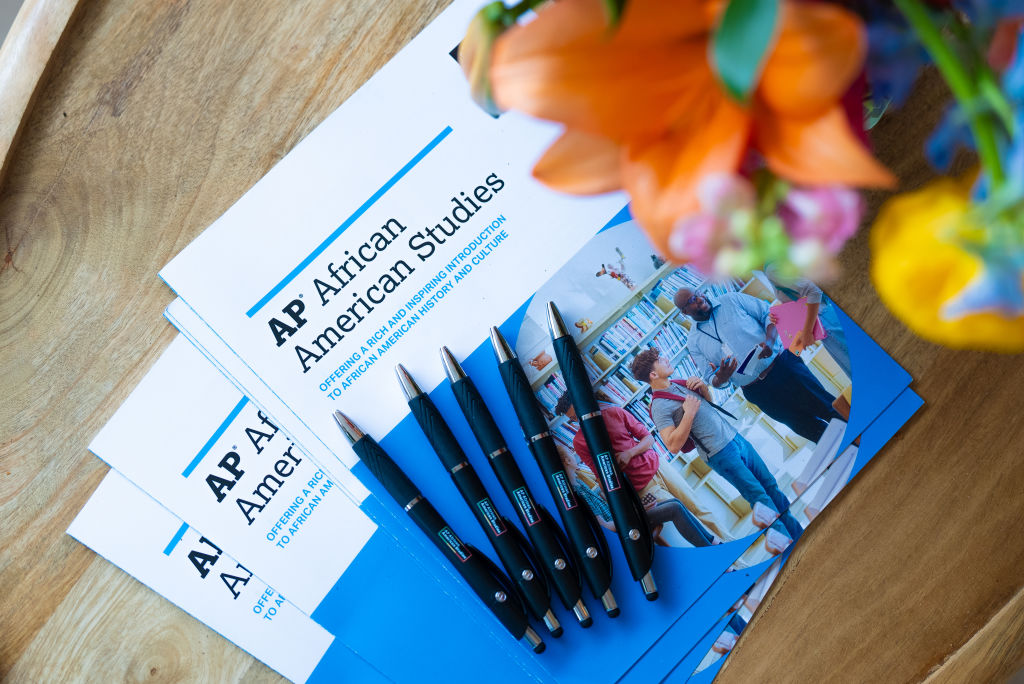
Despite Florida’s attempt to ban schools from teaching AP African American Studies earlier this year, the College Board on Wednesday released the final course framework.
Knowledge of several hot-button political topics and current events including the Black Lives Matter movement and the debate over reparations remain optional for the Advanced Placement (AP) exam. The new framework adds back in material on intersectionality and some new sources and topics on white supremacist violence and Black arts and entertainment.
AP African American Studies is in its second and final year of a pilot program, and the new framework comes almost a year after Florida Governor Ron DeSantis started publicly attacking the class as “indoctrination” and accusing it of trying to push a “political agenda,” during a larger national reaction to anti-racist programming in schools and workplaces in the aftermath of George Floyd’s murder.
Read More: What It's Really Like Inside One of Florida's AP African American Studies Classes
In the new framework, topics that Florida objected to in January, like Black Lives Matter and reparations, appear in a separate section called “Further Exploration,” which lists examples of things that teachers could talk more about in class, but that would not be required knowledge for the AP exam. Previous versions of the framework highlighted these topics as example essay topics that students could pursue, though they still weren't required material for the exam. Other topics in the “Further Exploration” section include incarceration—talking about the “disproportionate incarceration of African Americans”—Black cuisine, such as “soul food,” and Black women writers and filmmakers like Ava DuVernay.
The College Board released the course framework online on Feb. 1, the start of Black History Month, so the public could form its own opinions on the material amid the political pushback. Then in April, the College Board announced there would be more changes to the framework, and those are the changes that came out Wednesday.
Sixty high schools nationwide participated in the first year of the pilot, and nearly 700 schools are currently participating in more than 40 states, plus the District of Columbia. In spring 2024, students can take an AP African American Studies exam and potentially earn college credit.
When the Feb. 1 framework came out, some scholars balked that it didn’t include certain Black thought leaders who appeared as required reading in previous drafts, like Kimberlé Crenshaw, who popularized intersectionality, the idea of seeing discrimination through a lens of racial and gender identities. The College Board said it made those changes before the Florida Department of Education started tweeting about them. In the latest version of the framework, intersectionality gets top billing. One of the featured topics is called “The Black Feminist Movement, Womanism, and Intersectionality” and lists Crenshaw’s work as “essential knowledge.”
New sources in the unit “Origins of the African Diaspora” include artifacts to help teachers teach the history of the African continent. The topic “White Supremacist Violence and the Red Summer” now features photographs of the 1921 Tulsa Race Massacre. And there’s a new topic devoted just to African Americans who served in World War II, like Charity Adams, the highest-ranking Black woman officer who ran the operation that delivered mail from the U.S. to troops in the European theater.
Most of the new topics fall into the arts and entertainment category. In “Black Life in Theater, TV, and Film,” students will watch clips of dances on the TV show Soul Train, while in “Symphony in Black: Black Performance in Music, Theater, and Film,” students will be immersed in Duke Ellington’s music. When students get to “African Americans and Sports,” they will learn that Black athletes in Halifax, Nova Scotia, founded a hockey league in 1895 that predates the NHL and might see a photo of 49ers NFL players taking a knee at a 2017 game against the Seattle Seahawks. In the art sections, students will see Kehinde Wiley’s 2018 portrait of President Barack Obama and Amy Sherald’s 2018 portrait of First Lady Michelle Obama.
Schools had been asking for AP African American studies for the past decade, but course development efforts accelerated after Floyd's murder sparked a national reckoning on race relations. The course framework released Wednesday is the culmination of three years of work, in which 300 experts in African American studies and high school AP teachers were consulted.
More Must-Reads from TIME
- How Donald Trump Won
- The Best Inventions of 2024
- Why Sleep Is the Key to Living Longer
- Robert Zemeckis Just Wants to Move You
- How to Break 8 Toxic Communication Habits
- Nicola Coughlan Bet on Herself—And Won
- Why Vinegar Is So Good for You
- Meet TIME's Newest Class of Next Generation Leaders
Write to Olivia B. Waxman at olivia.waxman@time.com